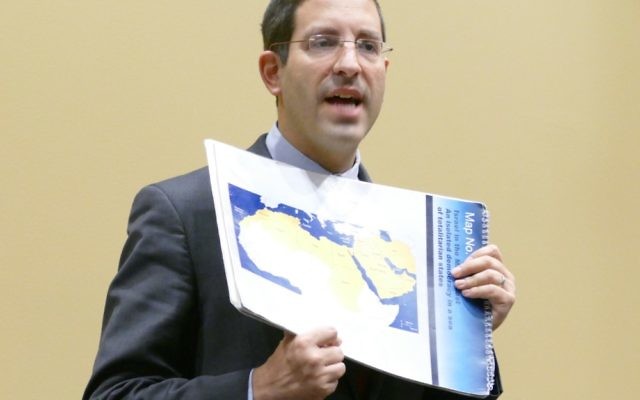Obama’s Exit Offers Israel Fresh Hope
By Sarah Moosazadeh | sarah@atljewishtimes.com
Israel was unhappy with the U.S. approach to the Middle East throughout Barack Obama’s presidency, Gil Hoffman told a gathering at Chabad of Cobb on Wednesday night, Jan. 11.
“Obama mishandled the Palestinian situation from the beginning,” said Hoffman, the chief political correspondent for The Jerusalem Post, who shared his insights on Israel’s future.
“We have a deep connection to the land of Israel,” said Rabbi Ephraim Silverman, Chabad of Cobb’s director. “Even after not living there for 2,000 years, we are still the children of Israel, and that’s why we say b’nai Israel.”

Gil Hoffman puts Israel’s position in the Middle East in perspective during an appearance at Chabad of Cobb on Jan. 11.
Hoffman, who will speak in his 50th state soon when he visits Hawaii, said Obama visited Israel during his 2012 re-election campaign and said he would never allow an anti-Israel resolution to pass the U.N. Security Council. But Hoffman said that, like many politicians, Obama lied, and he revealed his obsession with the West Bank settlements once he returned home.
That focus won’t produce peace talks, Hoffman said. “There are three things that will encourage negotiations: a desire to withdraw unilaterally, an Arab leader who Israelis trust and an American president they revere.”
He said the Palestinians are not in favor of a two-state solution, and the president of the Palestinian Authority, Mahmoud Abbas, is serving the 13th year of a four-year term. But politics have pulled the United States and Israel in opposite directions.
Still, “whatever conventional weapons our enemies have tried to defeat us with have failed,” Hoffman said. “The BDS movement, stabbings and terror attacks have all failed against Israel.”
The Palestinians aren’t the only problem for Israel.
Syria’s civil war crossed the border in late November when Islamic State forces fired at Israeli troops in the Golan Heights and Israel responded with deadly airstrikes. Israel’s main concern is protecting its borders from enemies that wish to wipe out the Jewish state.
“ISIS controls land 20 times the size of Israel and continues to pose a threat, but there are no operational plans to attack Israel since ISIS is busy killing their Muslim brothers,” Hoffman said.
The Iran nuclear deal raised additional security concerns for Israel, Hoffman said. “Lebanon possesses 130,000 missiles and rockets provided by Iran for retaliation, but no one will attack Iran as Europeans continue to fight each other for business in Iran, despite hangings and human rights violations.”
Since the United States and others reached an agreement on Iran’s nuclear program in July 2015, Iran has kept quiet and has advised its proxies and Hamas to do the same as money pours into the country.
The rising threat from Iran has allowed Israel to become closer to Egypt, Saudi Arabia and the United Arab Emirates through unpublicized security cooperation, even though the nuclear deal made Israel’s relations with the United States worse.
The faltering U.S.-Israeli relationship could improve under President Donald Trump, who has a Jewish daughter, son-in-law and grandchildren.
“Chances for peace rise exponentially when you have a president on Israel’s side,” Hoffman said.
A recent poll conducted by The Jerusalem Post found that 65 percent of Israelis think Obama is pro-Palestinian, compared with 3 percent for Trump.
“Israelis don’t understand American politics,” Hoffman said. “They liked Bush, and they liked Clinton, but when asked who is better for Israel, Republicans or Democrats, Israelis claim they don’t know.”
Moving the U.S. Embassy from Tel Aviv to Jerusalem remains Trump’s top priority for Israel, Hoffman said. “The world can’t decide where to put each country’s embassy. Why should it be any different for Israel? Why shouldn’t the embassy be in Jerusalem, and why should it entice violence if it is?”
The biggest challenge Israel faces today is younger Jews’ stance on being pro-Israel, Hoffman said. “I always feel like I’m walking on eggshells when speaking to Birthright groups, but we need to continue to educate, spread advocacy and stand in solidarity.”
He encouraged people to visit Israel and maintain activism on social media. “The best thing you can do for Israel is to be a mensch,” Hoffman said. “If you see a Facebook post for the IDF, like it. If you see a Twitter feed supporting Israel, retweet it. Israel needs your support.”




comments